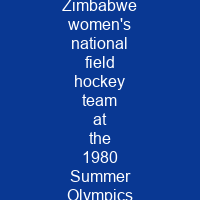The 1980 Zimbabwe women’s national field hockey team won the gold medal in women’s field hockey at that year’s Summer Olympics in Moscow. The gold medal was the country’s first Olympic medal of any colour. Moscow marked the southern African nation’s return to the Olympics after 16 years; as Rhodesia it had been excluded from the 1968, 1972 and 1976 Games for political reasons.
About Zimbabwe women’s national field hockey team at the 1980 Summer Olympics in brief

All matches were played at the Dynamo Arena, in the capital of the Soviet Union. All of these teams were competing as a result of the boycott, having failed to qualify for the Games. The matches were all played on artificial turf, which none of the Zimbabwean team members had ever seen; they had also never played together until that month. All players and official were white. Entirely amateur, the team mostly comprised players with professions unrelated to sport. Several had sporting relatives, most prominently Anthea Stewart, whose brother was the international cricketer Duncan Fletcher. The team included twin sisters in Sandy Chick and Sonia Robertson, who had played for South Africa 25 times before retiring in 1974, and Audrey Palmer, a seasoned hockey official and referee who played for Rhodesia from 1953 to 1961. At 35 years old, Stewart was the team’s oldest player, while Arlene Boxall, the 18-year-old reserve goalkeeper, was the youngest. At 18, Grant was the only other team member with international experience was made vice-captain. The squad left on 7 July, travelling first to the Zambian capital Lusaka and then to Luanda in Angola.
You want to know more about Zimbabwe women’s national field hockey team at the 1980 Summer Olympics?
This page is based on the article Zimbabwe women’s national field hockey team at the 1980 Summer Olympics published in Wikipedia (as of Nov. 05, 2020) and was automatically summarized using artificial intelligence.







